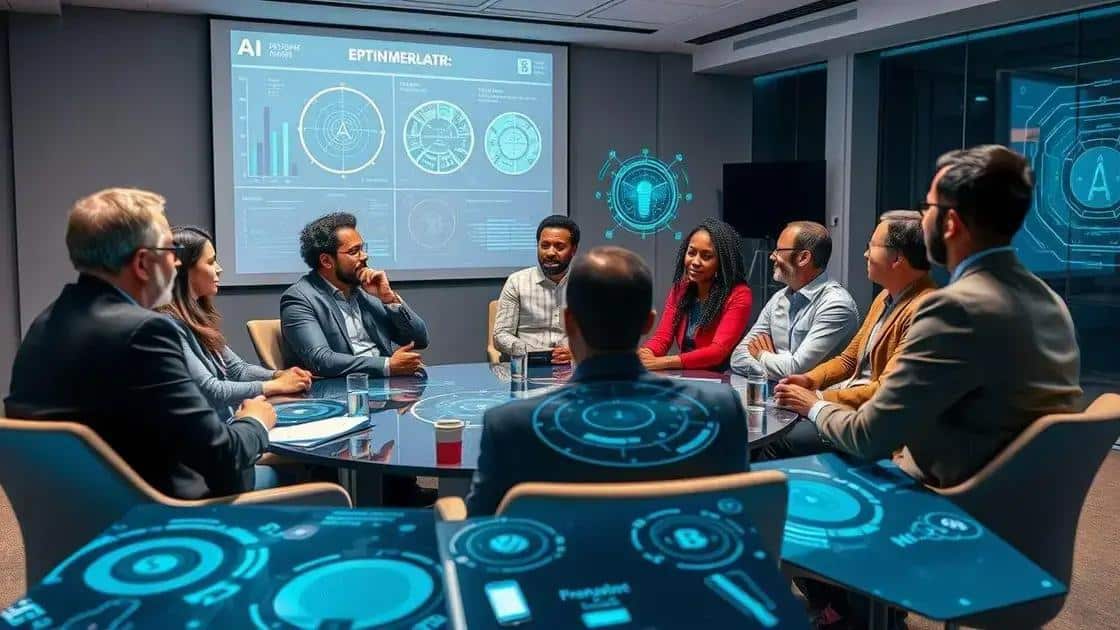Artificial intelligence breakthroughs take center stage at CES 2025

Anúncios
The future of artificial intelligence will enhance daily life through advanced applications, improve workplace efficiency, emphasize ethical considerations, and promote collaboration between humans and AI for innovative solutions.
Artificial intelligence breakthroughs take center stage at CES 2025, highlighting cutting-edge technology that might change our lives. Have you ever wondered how these advancements could influence daily routines and workflows? Let’s explore what’s coming next.
Anúncios
Trends shaping the future of AI
Staying ahead of trends is essential in the rapidly evolving world of technology. Artificial intelligence is no exception, especially as we look to the future. Various trends are emerging that are set to influence the way AI interacts with our lives.
Increased Personalization
One significant trend is the move towards increased personalization. AI systems are learning to adapt to individual preferences, making interactions more engaging and effective. This means everything from tailored recommendations to customized user experiences.
Anúncios
AI in Healthcare
AI is also transforming the healthcare sector. Innovations in this field are aiding in disease diagnosis, improving patient care, and enabling quicker drug development processes. Some examples include:
- Predictive analytics for patient outcomes
- AI-assisted robotic surgeries
- Virtual health assistants
- Streamlined administrative tasks
This evolution enhances both the efficiency and quality of healthcare services. Public and private sectors are investing significantly in these innovations, ensuring AI becomes a critical part of future medical practices.
Ethical AI
Another important trend is the focus on ethical considerations in AI development. As AI technologies become more integrated into our lives, the demand for transparent and responsible AI increases. Companies are recognizing the importance of:
- Developing fair algorithms
- Ensuring user privacy
- Promoting accountability in AI decisions
These considerations are essential to foster trust among users while ensuring innovation continues its positive trajectory.
Keeping attuned to these shifts will enable businesses and individuals to leverage artificial intelligence breakthroughs effectively. Embracing change and adapting to these trends will ensure we harness the full potential of AI.
Key innovations unveiled at CES 2025

The CES 2025 has showcased groundbreaking advancements in technology, particularly in artificial intelligence. These key innovations are not just impressive but also essential for shaping the future of various industries.
Revolutionary AI Assistants
One of the most talked-about innovations is the development of AI assistants that can anticipate user needs. These assistants will learn from interaction patterns, offering increasingly personalized experiences. Imagine having an AI system that schedules your appointments and suggests activities based on your past preferences.
Smart Home Integration
Another significant advancement is the integration of AI in smart home devices. With enhanced functionality, these devices now offer:
- Seamless connectivity across various platforms
- AI-driven energy efficiency suggestions
- Improved security features through machine learning
- Customized automation based on daily routines
These innovations not only make daily life easier but also save energy and enhance security in residential spaces.
Additionally, advancements in robotic technology were prominently featured. Robots are becoming more capable of performing complex tasks. For instance, AI-powered robots can assist in warehouses and factories, improving productivity and efficiency significantly. Many companies are exploring how robots can perform tasks alongside human workers, creating a collaborative environment.
Enhancing Virtual Reality (VR)
In the field of entertainment, AI is pushing the boundaries of virtual reality. Developers are now incorporating AI to create more immersive experiences. This means:
- Dynamic environments that change based on user interactions
- Enhanced realistic graphics through AI algorithms
- Adaptive storytelling that tailors the narrative to users’ preferences
AI is not just about improving technology; it’s about transforming experiences. As these innovations emerge, they open up new possibilities for how we interact with the digital world.
Impact of AI on everyday life
The impact of AI on everyday life is becoming more evident as technology advances. From personal assistants to smart appliances, AI is changing how we interact with the world around us.
Improved Convenience
One of the most noticeable effects is the convenience that AI brings. Devices can now learn our habits and preferences, making daily tasks easier. Think of how AI helps in:
- Smart home devices adjusting settings automatically
- Voice-activated assistants managing schedules and reminders
- Personalized shopping experiences based on past purchases
This level of assistance not only saves time but also makes our lives more efficient.
Enhanced Communication
Artificial intelligence is also reshaping the way we communicate. AI-driven tools provide real-time translation, making it easier to connect with people worldwide. For instance, apps can seamlessly translate conversations during a video call, breaking down language barriers.
Moreover, social media platforms use AI to suggest content tailored to our interests. This personalization improves engagement and keeps users connected to relevant topics.
The healthcare sector is another area where AI’s impact is profound. AI systems enhance diagnostics, helping doctors make quicker and more accurate decisions. They analyze patient data, leading to better treatment plans and improved patient outcomes. These advancements reduce wait times and enhance the quality of care.
Impact on Work
AI’s influence extends to the workplace as well. Automation is streamlining various tasks, enabling employees to focus on more complex responsibilities. Many businesses now rely on AI for:
- Data analysis to improve decision-making
- Automating repetitive administrative tasks
- Enhancing customer service with chatbots
As a result, organizations can operate more efficiently and effectively. Workers can engage in more meaningful tasks, leading to greater job satisfaction.
In summary, the impact of AI on everyday life is substantial. From enhancing communication to improving healthcare and altering workplace dynamics, AI is shaping our future in ways we are only beginning to understand.
Expert opinions on the future of AI

Expert opinions on the future of AI provide valuable insights into how this technology will evolve and impact various sectors. Many industry leaders share their thoughts on the advancements we can expect in the coming years.
Growth in AI Applications
One common belief is that AI applications will continue to grow exponentially. Experts agree that sectors like healthcare, finance, and education will benefit immensely. For instance, AI could streamline:
- Patient diagnostics and treatment plans
- Fraud detection in financial transactions
- Personalized learning experiences in classrooms
This growth suggests a bright future where AI enhances our daily lives and workflows.
Emphasis on Ethical AI
Another focal point among experts is the increasing emphasis on ethical AI. As AI becomes more integral to decision-making processes, professionals believe it is vital to ensure fairness and accountability. Addressing this concern involves:
- Creating guidelines for responsible AI use
- Implementing bias detection in algorithms
- Promoting transparency in AI systems
By prioritizing ethics in AI development, companies can build trust with users while harnessing the power of this technology.
Many experts also highlight the importance of collaboration between humans and AI. Rather than viewing AI as a replacement for human jobs, the focus should be on how it can augment our abilities. For example, AI can handle repetitive tasks, allowing workers to concentrate on more complex and creative aspects of their jobs. This collaboration enhances productivity and fosters innovation across various industries.
The Role of Regulation
Lastly, the role of government and regulatory bodies is crucial in shaping the future of AI. Experts suggest that regulations must evolve alongside technology. Keeping pace with rapid advancements will ensure that AI is deployed in safe and beneficial ways. Key areas of focus might include:
- Establishing standards for AI development
- Monitoring the impact of AI on employment
- Curbing misuse of AI in surveillance and privacy violations
As discussions around AI continue to unfold, expert opinions are critical to guiding the development and implementation of these technologies.
In conclusion, the future of artificial intelligence is filled with exciting possibilities. As technology continues to advance, it will play a more significant role in our everyday lives. Experts believe AI will enhance our experiences, improve workplace efficiency, and promote ethical considerations in development. Collaboration between humans and AI can lead to innovative solutions, benefiting a variety of sectors such as healthcare, education, and beyond. Staying informed about these trends ensures that we can harness the power of AI responsibly and effectively.
FAQ – Frequently Asked Questions about the Future of AI
How will AI impact my daily life?
AI will enhance convenience through smart devices, making daily tasks easier and more efficient.
What ethical concerns should I be aware of regarding AI?
Ethical concerns include fairness, transparency, and accountability in AI systems to ensure they benefit all users.
How can businesses leverage AI for better performance?
Businesses can use AI to automate repetitive tasks, analyze data, and improve customer interactions, leading to increased productivity.
What role does collaboration between humans and AI play?
Collaboration allows AI to handle routine tasks while humans focus on creative and strategic roles, fostering innovation.






